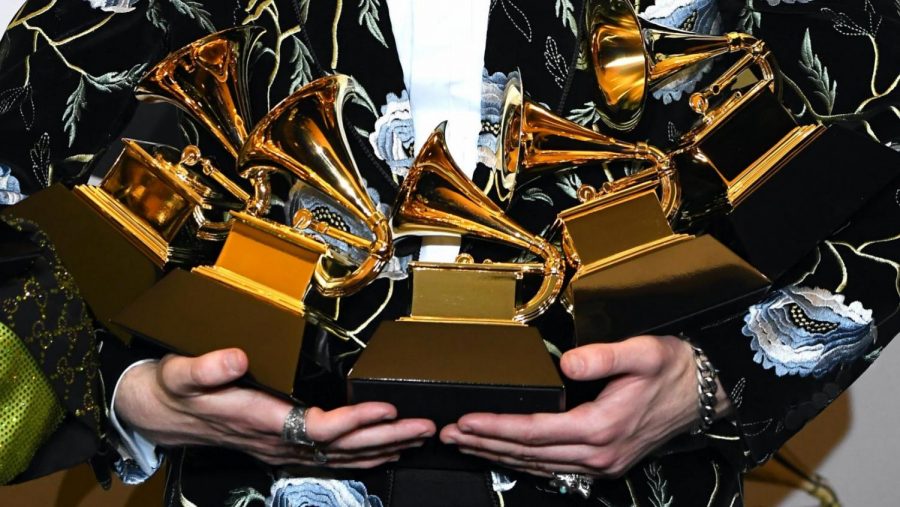As per usual, people are up in arms regarding several decisions the Grammy Awards made this year. From nominations and snubs to subtly racist behavior and categories, the Recording Academy is getting a lot of negative attention this year, and for good reason. But the relevance of the award show cannot be denied, which is even more reason to care.
The Grammy Awards officials released the 2021 nominations on Nov. 24, marking their 63rd annual award show, coming in January. After the last award show, musicians like Tyler, The Creator spoke publicly about the academy’s “otherism” and musical segregation with categories like Urban Music, taking Black pop artists and putting them in different categories despite making similar music to their white contemporaries.
The Grammys officials did their best to diminish that backlash this year, as well as the criticism they were receiving in regards to their World Music category, as it mostly groups non-North American musicians in one category regardless of genre, style or artistic intent.
There should be an easy solution to the issue of the Grammys throwing Black pop artists into an Urban Music category, since they sound like the musicians in the general Pop field: get rid of the Urban category and give Black artists the same opportunity to win in general categories as white artists.
But that’s not what the Grammys did. They simply changed the name to Progressive R&B and didn’t change anything about the nominees or intent behind the category. Rightfully so, people were upset with the oddly out-of-touch position the Academy was taking during such an unjust summer.
This November, members of the Recording Academy made another decision regarding the World Music category: instead of dividing into more specific and inclusive categories, they renamed it Global Music, arguably the same solution they used for Urban Music. It received the same response from musicians and fans alike.
So after these two objectively tone-deaf solutions to simple problems, the Grammys were hit with the typical snub complaints and comments about corruption in response to their 2021 nominations. The most notable snub was pop and R&B sensation The Weeknd who released one of the most commercially successful pop records of 2020, “After Hours.”
Most people count on the Grammys to ignore more underground accomplishments, but The Weeknd’s album and singles did incredibly high numbers on the radio and on streaming services.
While Recording Academy Chairman Harvey Mason Jr. denies all accusations of corruption, many critics take this situation and ignore it, saying the Grammys are irrelevant and none of this really matters. Common feeling is that true music fans know who succeeded this year, and we should give up rooting for the Recording Academy.
That’s just not the case though. No matter how many snubs or politically incorrect decisions the Academy makes, the Grammys are still one of the most significant and relevant delegators of popularity in the music industry. The amount of opportunity that one Grammy Award gives to a smaller artist can be endless.
Columbian alternative-pop artist Lido Pimienta may not have started with a lot of industry attention, but after her nomination for Best Latin Alternative Album, she was ecstatic on social media, and she will most likely receive plenty of new collaborative deals or new fans in the wake of the nomination.
Same goes for rapper Freddie Gibbs, who has done wonders in the underground. With his new album “Alfredo” in the Best Rap Album category, marketing and other financial opportunities may expand a whole lot. Simply being nominated for an award can propel your name and brand to new levels. If the Grammys ignore someone as commercially successful as The Weeknd and deprive him of that Academy exposure, think of the millions of smaller underground artists who are snubbed too.
Every artist and fan knows that the Grammys mostly get it wrong every year, and they have a lot of catching up to do socially, but don’t turn your head away from them. Just like the Oscars, whether we like it or not, the Grammys will always be relevant. That is more of a reason to hold them accountable for socially blind decisions like Urban Music becoming Progressive R&B.
The Grammys can potentially be a beautiful thing. Especially with the blurring between mainstream and underground music—thanks to streaming services—the award show can be a progressive space for rewarding the most successful and artistically epic achievements of each year.
As of right now, it is a big mess. But instead of rolling our eyes at every vaguely racist thing they do, we can be vocal about change. We can speak out in favor of equality with solutions against the socially and artistically out-of-touch Academy.
When enough people put support into the Academy instead of ignore it, we can live in a world where one of the most relevant signs of musical popularity and success isn’t such a big pile of crap.




